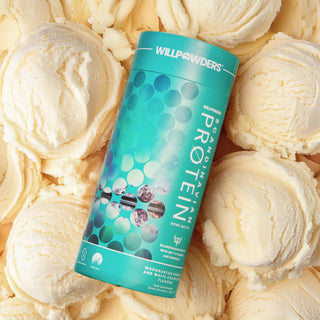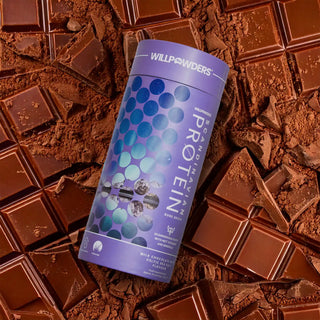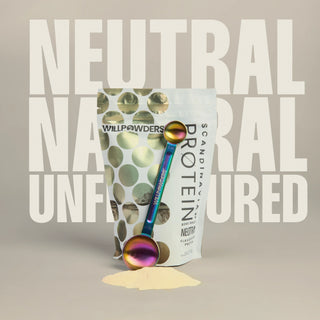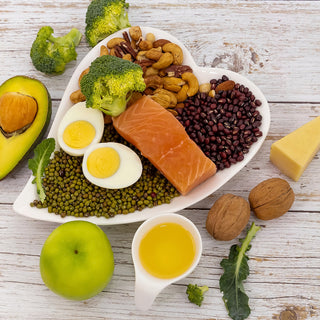
When We Ask ‘Is MCT Oil Bad for Cholesterol?’ Are We Asking the Wrong Question at the Right Time?
MCT Oil: the one in which we say, no, MCT oil is not bad for cholesterol but the existence of that question suggests modern perspectives on wellness may be skewed.
Here at WillPowders, at our finest, we could change the wellness rating in your life for the better and we could also make a positive difference to the number of years you live in wellness. At the risk of getting all philosophical, WillPowders live by the idea that, at the very least, we do you no harm! At our best, we transform lives by helping people step off the dreadful treadmills that modern Western diets and ways of living have placed us on. We do this by helping you hack your body’s fullest potential, allowing it to do what it's desperate to do for you, that is keep you well, given the right tools. In fact, we are assured that the list of positive effects of MCT oil can bring about metabolic benefits without undermining your metabolic health.
Question: How did we reach this conclusion? Answer: We left it to the experts.
There are scientists who systematically review the findings of other scientists. (We know! The careers teacher never put that career option in front of us, either!). A systematic review of a breadth of scientific studies on MCT oil and its effects on cholesterol was conducted in 2021 by five scientists. The conclusions they reached in that review were that ‘MCT oil does not affect total cholesterol, LDL cholesterol, or HDL cholesterol levels’. LDL and HDL cholesterol are often referred to as ‘bad’ cholesterol and ‘good’ cholesterol, respectively. The review led the scientists to be able to give very high confidence limits to the findings regarding the effects MCT has (or in this case doesn’t have) on cholesterol. This is what they had to say, ‘the 95% confidence limits from our meta-analysis indicate that MCT oil is unlikely to cause meaningful changes in either total cholesterol, LDL cholesterol, or HDL cholesterol’. We like those figures! Lovely jubbly! QED!
But, we hear you cry, it’s a saturated fat, the spawn of the Devil!
The discussion on the fact that MCT oil is a saturated fat comes with a caveat since, ‘MCFAs [medium chain fatty acids] are less harmful in regard to changes in blood lipid concentrations than long-chain SFAs [saturated fatty acids]’ which means our knee jerk reaction of believing that all saturated fats are bad for our heart is quite simply wrong. It’s forgivable because, for a long time, we have been taught to consider saturated fats as if they were all one homogenous, cookie-cutter type of fat which spells disaster for the heart. If we are to move forward with how we adjust the fats we willingly put in our bodies, that misguided thinking needs to change.
Due to the properties of MCT oil, our reaction to the fact that they are saturated with carbon atoms (which is what the ‘saturated’ in saturated fat means) requires a much more nuanced approach. MCT oil does not behave like the ‘typical’ saturated fat that we’ve been led to believe will target your arteries and cling to them like limpets to a rock at low tide. That’s because MCT oil benefits can be enjoyed without them entering the lymphatic system as other fats do. MCT oil is broken down in the gut into medium chain fatty acids which are then transported straight to the liver via the hepatic portal vein. From there the liver converts them to ketones to fuel the body and brain, with the MCFAs acting more like glucose than fat, without the risk of an insulin or sugar spike. It’s for these reasons that the way we regard MCFAs needs to be more nuanced.


MCT in the fight against metabolic syndrome
Plenty of the fats present in human diets since the Industrial Revolution (some of which were originally produced to grease machines!) are at odds with what our genes are capable of dealing with. Now they didn’t tell us that in our history lessons, did they? Our fatty acid intake profiles just aren’t what they were 10 000 years ago! Our genome is still paeleolithic in nature and has not had time to adapt to the modern way of eating which is peddled by Big Food and our new-found addictions to carbohydrates. But WillPowders C8 MCT Oil bucks this trend in a thoroughly new way. It seems that our body likes the fact that science has isolated the shorter of the medium chain triglycerides naturally present in coconuts - C8. It can put them to good use in the fight against metabolic syndrome by helping with weight management, longer satiation and higher energy expenditure. Medical professionals seem to agree that metabolic syndrome is caused by the modern Western diet. Answering yes to just three of the signs can see you diagnosed with the disease. In essence, it’s the one that the government is desperate to have you step away from but is still happy for Big Food to produce products that welcome it in as sure as the sun rises.
The symptoms are a dubious pick and mix from a list of:
- fat stored around the tummy
- plus a high BMI
- and increased waist circumference beyond 35 inches for women and 40 inches for men
- raised blood pressure
- and signs of insulin resistance
If we are merely asking if MCT oil is bad for cholesterol, which you now know it isn’t, then we are missing the idea that 1 in 5 Europeans will be diagnosed with this disease that marshals in cardiovascular disease and Type 2 diabetes. It isn’t just cholesterol markers that determine our likelihood of succumbing to fewer years living in health, never mind the mortality risk.


We’re in a body for a reason - you get one, I get one, we all get one!
The more we are encouraged to ask myopic questions about singular aspects of wellbeing, rather than seeing ourselves as a whole made up of constellations of interactive and interdependent vital systems, the easier it is for Big Food to sell us a singular ‘solution’. If you’re a woman, you’re already used to blaming yourself for what’s happened to your body (and, the more men verbalise their experiences of body image and mental health, the more we see we are beginning to stand in solidarity against Big Food and government ‘advice’ which you can learn about here). This isn’t because it’s our fault, but because we’ve been told it’s our fault and we’ve probably been taught to people please, and so we fall in and nod along that, yes, we must surely lack willpower and, by way of an apology, we’ll buy yet another over-priced, under-nourishing fat-free yoghurt pumped full of thickeners that our body doesn’t even recognise as food. Maybe this time it will prove to be the golden ticket … ?
But, there is a ‘but’ that we need to unpack so that you breathe easy again
The same systematic study found that MCT oil, ‘does not affect total cholesterol, LDL cholesterol, or HDL cholesterol levels, but does cause a small increase in triglycerides’. However, the good news is that the ‘increase in the triglyceride level with MCT oil intake is consistent with only a small increase in the risk of heart disease, which is unlikely to be clinically meaningful on an individual level’. Triglycerides are a type of fat found in the blood that can be stored and used for energy later. This is not a type of cholesterol but it is the type of fat that we would not want in high quantities in our bodies, as it is yet another indicator of metabolic syndrome. Triglycerides are usually present in high quantities in blood if we have a high carbohydrate diet. Compare the risk of higher triglycerides from carbs to those of MCT oil and it’s a no brainer - the carbs are running amok with increasing triglyceride levels. If you do the maths, lowering carbohydrates is more likely to reduce triglycerides more than the rise in triglycerides potentially caused by MCT oil (in a diet that has to contain other types of fat to avoid malnutrition) by levels which are ‘unlikely to be clinically meaningful on an individual level). Add exercise into this equation as a triglyceride lowering activity and the benefits to the heart and whole metabolic system must surely outweigh that small, arguably insignificant ,and certainly offset, rise in triglycerides?
MCT oil builds a bridge back to being well in our bodies again
With modern diets skewed towards higher carbohydrates making up the calories that were once filled with fat, and our genes being practically palaeolithic, most ‘new’ fats, for example, trans fats, are a disaster for the lag in our genome which simply can’t deal with them. But MCT oil seems to be welcomed with open arms by our bodies and brains. It’s a case of the exception to the rule with this particular refinement of a lipid being good news for us all.
Couple this with the simple truth that our bodies were meant to move and our more sedentary lifestyles, which we have choices about, or our more sedentary jobs, which we might have to put up with in order to pay the bills, need to be counteracted with movement. If you want to cut down on the effects of longer chain saturated fatty acids and carbohydrates increasing triglyceride levels, enriching your diet with MCT oil and getting physically stronger through a movement of your choice might be the way to go.
In a world where Big Food is still, unfortunately, the loudest voice, we need approaches that are wonderfully modern, like WillPowders MCT Oil, alongside age-old knowledge that our genetic lineage still belongs to our most ancient ancestry when homosapien stood up and walked towards a good fat supply!
Further Reading
To read the abstract and conclusions on MCT Triglyceride Oil and Blood Lipids have a peek here MCT oil does not affect total cholesterol but it does cause a small increase in triglycerides
To read more about the ancient role of fats in our diets, this is a fascinating read Pathophysiology and Evolutionary Aspects of Dietary Fats and Long-Chain Polyunsaturated Fatty Acids across the Life Cycle
To understand more about metabolic syndrome try here
Disclaimer
Our blogs are written with love in the hope that they go some way in helping you feel like the rockstar you are, and whilst we do our due diligence, research like maniacs and fact check our stuff, we know everyone’s journey is different. They are intended to educate and empower you, not usurp medical advice. We would never advise you to stop, adjust, or modify any prescription medication without the direct supervision of your healthcare practitioner, but don’t be afraid to talk to your doctor about your new found knowledge, brought to you by the marvels of nature because they don't know everything! Blogs are always informed by Davinia but often written by a member of the team. Not all blogs reflect Davinia's experiences and sometimes provide alternative perspectives



















